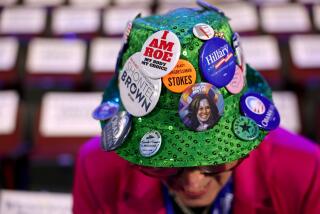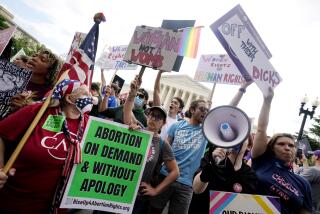CALIFORNIA ELECTIONS<i> /</i> GOVERNOR : Feinstein Focuses on Abortion as Major Issue
- Share via
SAN DIEGO — Dianne Feinstein, her fingers crossed that the retirement of associate Supreme Court Justice William Brennan will raise the profile of the abortion debate, said Sunday that abortion rights will be the definitive issue in the 1990 gubernatorial campaign.
In a line of attack criticized by Republican nominee Pete Wilson’s campaign as “a pure, unadulterated scare tactic,” Feinstein suggested that the only way to ensure abortion rights in California is to elect her as governor.
“I will veto any and all legislation that threatens a woman’s right to choose,” the Democratic nominee told cheering abortion rights advocates gathered here.
Her assault on Wilson’s votes against federal funding for abortions, and his support of two abortion opponents now on the Supreme Court, was the opening to a broader criticism of the entire Republican ticket.
Accompanied to a hotel here by the rest of the Democratic ticket, Feinstein characterized the GOP’s team as “anti-choice,” apparently basing the judgment on opposition to abortion voiced by two statewide Republican candidates. Wilson describes himself as an abortion rights advocate and his votes frequently--but not always--bear that out.
“It is a Republican Party that would not regulate savings and loans--but would regulate a woman’s reproductive system,” said Feinstein, attempting to tie together two emotional issues to voters. Both parties recently have tried to cast each other as the villain in the escalating scandal involving the nation’s thrift institutions.
Wilson’s campaign director, Otto Bos, accused Feinstein of inaccurately fanning fears of a turnaround in the state’s position on abortion rights. The California Constitution contains a privacy provision--not present in its federal counterpart--that state courts have said prevents legislative restrictions to abortion.
“Dianne Feinstein knows that,” Bos said. “It is a pure, unadulterated scare tactic to make people believe that the right to choose is threatened in California.”
The Democratic team’s foray into San Diego was a high-profile attempt to draw attention away from state Republicans, who concluded their three-day convention here Sunday. Among other things, the state GOP tabled an attempt by conservatives to put the party on record as opposing abortion except in cases of rape, incest or when the mother’s life is in danger.
The Brennan resignation could put Wilson in a difficult position, since the incoming justice is expected to be the swing vote on abortion rights cases.
Some Democrats believe a vote to support a justice perceived to be against abortion rights could drive Republicans who support abortion rights away from the GOP ticket. A vote against such a justice--or approval of one perceived to support abortion rights--is likely to reopen the dispute between Wilson and conservative Republicans.
Both sides on Sunday were trying to determine what impact President Bush’s court appointment might have on the gubernatorial campaign.
Although Feinstein said in her speech that “no single issue more clearly defines the difference” between Republicans and Democrats this year than abortion rights, she later said it was difficult to fully gauge the impact.
“The impact . . . I think will be to crystallize the sides perhaps even more than they have been already,” she said.
Bos insisted that the political impact of the Brennan resignation is mixed.
“The fact of the matter is there are people that feel strongly about the issue in both parties,” he said.
The state races in which candidates are furthest apart on the issue include attorney general, where Republican Dan Lungren opposes and Democrat Arlo Smith supports the unabridged right to an abortion. A similar schism occurs in the race for lieutenant governor between Republican Marian Bergeson and Democratic incumbent Leo T. McCarthy.
Neither Feinstein nor Wilson has a consistent record on abortion rights; Wilson, like Feinstein’s primary opponent John K. Van de Kamp, has questioned the former San Francisco mayor’s pre-campaign commitment to abortion rights.
Both have made an issue of Feinstein’s decision not to sign, when she was mayor, a resolution commemorating “reproductive rights day” on the 10th anniversary of the Roe vs. Wade decision mandating abortion rights. Feinstein said Sunday she decided not to sign it because she was trying to keep the peace in a city already reeling over the assassination of her predecessor, George Moscone, and the deaths of hundreds of San Francisco residents who had followed the Rev. Jim Jones to Jonestown, Guyana.
Both events, however, occurred in 1978, more than five years before the resolution was advanced to Feinstein. Earlier this year, she also said she would consider signing a bill outlawing abortions done for purposes of sex selection, only to reverse herself after a controversy arose over the statement.
More to Read
Get the L.A. Times Politics newsletter
Deeply reported insights into legislation, politics and policy from Sacramento, Washington and beyond. In your inbox twice per week.
You may occasionally receive promotional content from the Los Angeles Times.









